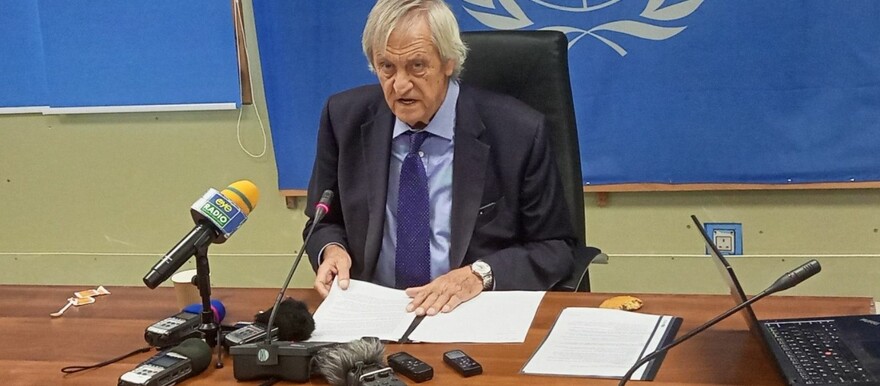The head of the United Nations Mission in South Sudan (UNMISS) Nicholas Haysom has said the peace process which will lead to the country’s democratic transition, still needs much work.
Haysom, also the UN Special Representative of the Secretary-General in South Sudan, addressing the press in Juba on Wednesday called on South Sudanese leaders to continue implementing the necessary benchmarks to ensure the conduct of free and fair elections in South Sudan at the end of the extended period.
Mr. Nicholas Haysom made the remarks during a press conference held in the UNMISS compound in Juba on Wednesday. While at the conference yesterday, he addressed the press on his recent visit to the US to brief the UN Security Council at the 77th UN General Assembly in New York on the general situation in South Sudan.
The UN boss also shared on the says despite tangible achievements on the roadmap and the ongoing graduation of the necessary unified forces, the peace process is not yet done.
“As I emphasize to President Kiir and First Vice President Machar at my last meetings with them respectively, neither the roadmap nor the graduation of the necessary unified forces is an endpoint in South Sudan’s journey on the path to democratic transition,” he said. “It brings new challenges including the sustainment, accommodation, payment, ranking, and deployment of the forces which remains a concern to the Security Council.”
He notes, “We have seen the graduation of a significant part of the first batch of the necessary unified forces. We believe that the officials promise that the transitional government can begin creating a truly national South Sudanese armed force. This can serve to mitigate inter-communal violence and protect citizens to an effective and professionalized security sector.”
The UNMISS boss further raised concerns over the ongoing violence between the splinter rebel factions of SPLM/A-IO Kit-Guang groups of General Johnson Olony and General Simon Gatwich Dual in parts of Malakal and Mayom County of Unity State displacing thousands of civilians.
“Even with these positive developments, as I shared with the Security Council, inter-communal conflict continues to fuel repeated cycles of violence. These have the potential to erode the gains made towards sustaining peace across South Sudan,” he added.
“UNMISS is working with the state authorities and humanitarian agencies to support sustainable solutions in Malakal. It is urgent to prevent overcrowding, and the outbreak of diseases as well as maintain peace within the communities that live within the UN Protection of Civilian Sites.”
At the press conference, Haysom also condemned the ongoing violence in Malakal, Mayom in Unity State, Warrap, and Abyei.
“We also condemn the violence in Mayom in Unity State and in Lualbet and most recently Anet in Warrap resulting in casualties and the mass displacement of women and children in the whole village. In recent days the Twic – Ngok Dinka conflict has created a new way for refugees in Abyei, Warrap, and Northern Barh El Ghazel. Since 23rd of September about 3500 vulnerable persons have been displaced to various bomas in Twic County.”
According to the UN, 8.9 million people across South Sudan would be food insecure this year and would need humanitarian aid as a result of flooding across the seven states as well as conflicts in some parts of the country.
Reacting to the arms embargo, the UN chief maintains that South Sudan leaders have a role to meet the benchmarks necessary before the UN Security Council lifts the sanctions.




